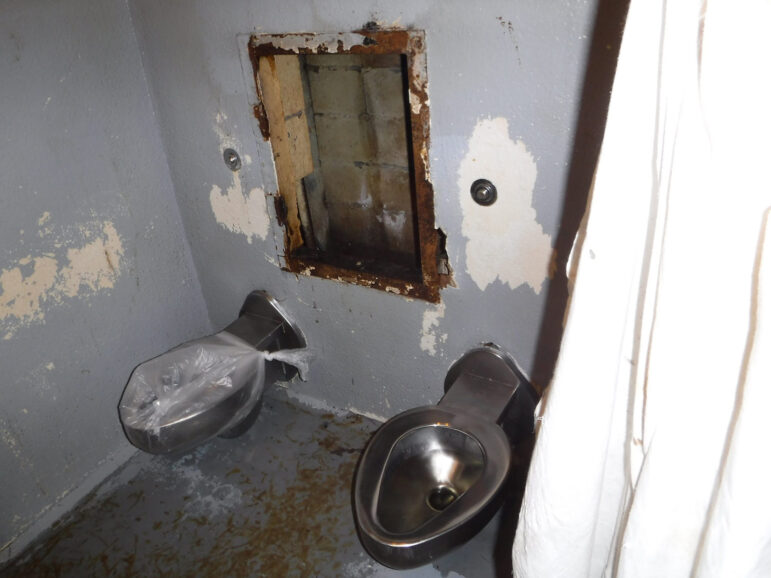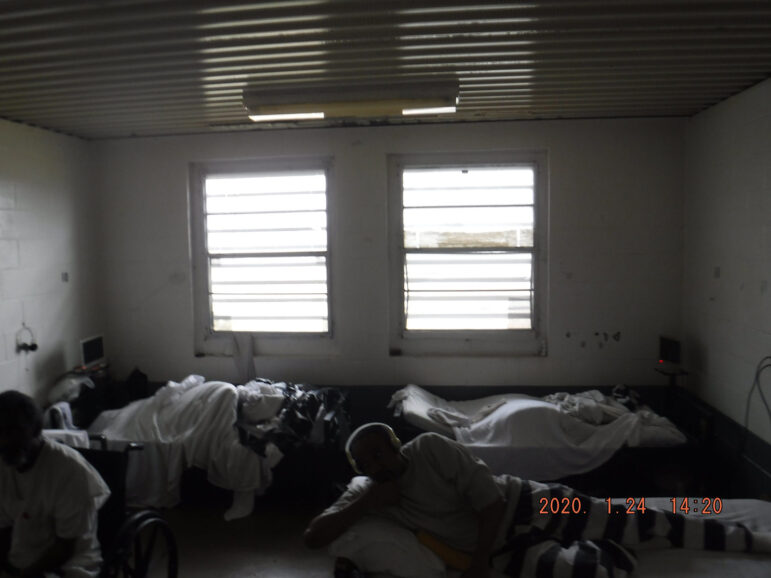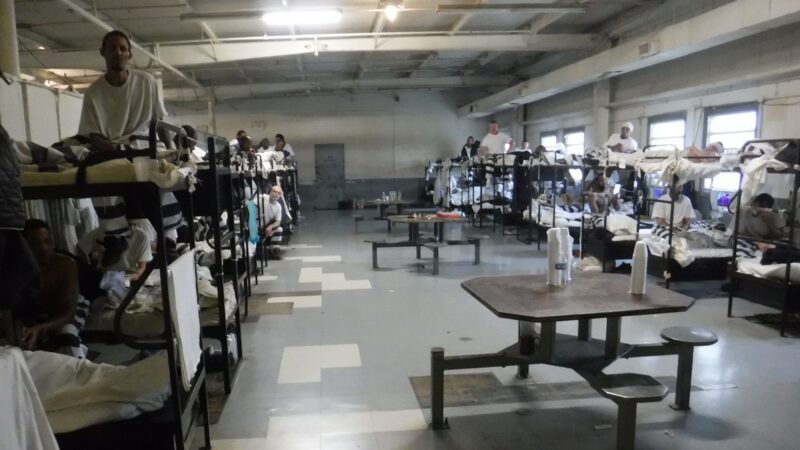Q&A: After DOJ’s Parchman report, what changes are needed at Mississippi Corrections?
This contributed photo from Disability Rights Mississippi shows inadequate conditions inside Mississippi State Penitentiary, also known as Parchman. The photos were obtained by DRMS and published in a 2021 report citing inadequate medical and correctional staff and poor healthcare practices at the state prison. DRMS’ report is similar to one released last week by the U.S. Department of Justice.
The U.S. Department of Justice published a report last week, outlining how the Mississippi Department of Corrections is violating prisoners’ rights at the Mississippi State Penitentiary, also known as Parchman.
The report also details how the corrections department is failing to protect prisoners from violence. The Justice Department began its investigation into Parchman in February 2020 after prison riots left some incarcerated people injured and dead.
The Gulf States Newsroom’s criminal justice reporter, Brittany Brown, sat down with Mississippi Public Broadcasting’s Desare Frazier to discuss the report and its findings. The following transcription of their conversation has been edited for clarity.
Frazier: Brittany, how did the investigation start, and what are the report’s initial findings?
Brown: In December 2019 and January 2020, fights, riots and fires broke out at Mississippi prisons across the state, including Parchman, causing prisoners to be killed and injured. As a result, all state-run prisons went on lockdown for a while. For months leading up to the riots, there had been reports of unlivable conditions, gang violence and staffing shortages at Parchman. In the midst of all this, there had been leadership changes and resignations among the heads of the Mississippi Department of Corrections. To give you an example of how serious the violence was, it was reported that five people incarcerated at Parchman had been killed, and three others died by suicide during the month of January 2020 alone. After this, the Department of Justice, announced an investigation into four Mississippi prisons, including Parchman, just before the COVID-19 pandemic. Two years later, the report was published last week.
The report is 59 pages long, and the Department of Justice outlines essentially four main issues: that the Mississippi Department of Corrections does not protect prisoners from violence caused by other prisoners. There have been at least 10 homicides in Parchman since 2019. It also says that MDOC does not meet the serious mental health needs of prisoners and has too few qualified mental health staff on site at Parchman. It says that MDOC fails to identify and treat prisoners who are at risk of suicide. At least 12 people in Parchman have died by suicide in the last three years. Lastly, the report states that MDOC regularly misuses and overuses solitary confinement, particularly with prisoners who have serious mental health and physical health needs. Overall, the Department of Justice says these issues are severe, systemic and exacerbated by staffing and supervision deficiencies.
Frazier: The report does find that the corrections department violated prisoners’ constitutional rights at Parchman Penitentiary. What are those rights, and how are they being violated?
Brown: The report states that MDOC is violating prisoners’ rights by misusing solitary confinement, not providing adequate healthcare and the staffing shortages that are exacerbating solitary confinement and other mistreatment outlined in the report.
Specifically, the 8th Amendment — that one forbids cruel and unusual punishment. And, the 14th Amendment — that one ensures due process.

Frazier: I see. I see. Well, is this issue of how inmates are being treated in Mississippi, is that new at all?
Brown: No, it isn’t. In fact, on Monday, I heard from a man incarcerated at Parchman who told me that these exact issues have been going on for the 20-plus years that he’s been in prison. He said that he feels like MDOC doesn’t care about them and that he’s seen it all happen — everything outlined in the Department of Justice report.
I also spoke with Greta Martin, director of litigation at Disability Rights Mississippi. Her organization, like I just said, published a report last year that was very similar to this new Department of Justice report, citing inadequate medical and correctional staff and poor healthcare practices at Parchman and other prisons in Mississippi. Martin says advocates and lawyers have been sounding the alarm on poor conditions at Parchman for decades now.
Audiotape of Greta Martin: The things that the DOJ reported are issues that many of us that have been doing this work for quite some time, we’ve seen this for years. And these condition issues have been ongoing. It’s really sad to say because, in my opinion, the state of Mississippi has been aware of these issues for quite some time
RELATED: Click here to view photos of conditions inside Parchman from the DRMS report.
Brown: The report outlines other issues in Parchman, like prisoners extorting each other and their loved ones; contraband like cell phones, drugs and weapons — some being brought in by MDOC staff; holding most of the prisoners in solitary confinement for over a year straight; and more.

Frazier: Burl Cain, the commissioner, came on board to correct a lot of these things, appointed by Gov. [Tate] Reeves. How is Cain responding to what DOJ is reporting at this point?
Brown: Well, last week, MDOC told me that their legal team says they can’t respond to questions about this. So, we’ll see. Now, like you said, since Cain was appointed in May 2021, MDOC has made efforts to raise correctional officer pay to keep staff on the job.
MDOC says it re-opened the Walnut Grove Correctional Facility last year to help prisoners recover from addiction and disaffiliate, or leave, their gangs. And the department has made strides to bolster reentry programs for prisoners. But how much of this is actively helping solve the issues outlined in the Department of Justice report? That’s hard to say right now.
Cain comes to Mississippi from the Louisiana State Penitentiary, also known as Angola, where he was warden for over two decades. Angola and Parchman have very similar issues. Misuse of solitary confinement, so on and so forth. But, Mississippi can also look to Alabama for some context here, too. In 2020, the Department of Justice filed a lawsuit against the Alabama Department of Corrections after the DOJ alleged that ADOC failed to take action to resolve the issues outlined in a 2016 report about poor conditions at men’s prisons in Alabama. So, if Mississippi leaders don’t take swift action, it’s possible we could see a similar fate. In fact, on the last page of the report, the DOJ warns that it could file a lawsuit exactly 49 days after this report was published if state officials haven’t addressed these issues.
Frazier: So, what kind of solutions does DOJ want for the department to come into compliance?
Brown: The Department of Justice outlined a lot of ways that MDOC can try to solve some of these issues. Nearly 10 pages alone are dedicated to solutions. Some of those measures include changing how the prison approaches correctional officer staffing. The DOJ wants MDOC to fully screen, train and hire C-Os and offer them competitive salaries and benefits. Put a policy in place that will prevent retaliation against prisoners for reporting C-O misconduct. Implement a prisoner classification system that will protect prisoners from the risk of harm. Install more cameras to help with supervision and repair all broken security equipment. Conduct clearly documented cell inspections to remove contraband. Revise the mental health screening process to be done regularly and by trained staff. Provide timely and adequate medical care to prisoners. And there’s so much more. The report provides a very detailed list of solutions to the issues outlined, so we’ll just have to wait and see how MDOC and other state leaders respond.
Greta Martin says to fix Parchman, it’ll take collaboration from multiple people and organizations. But she’s also not really sure if the prison can be fixed at this point.
Audiotape of Greta Martin: I think it’s going to take an effort with both the medical vendor for the department of corrections to work hand in hand with the current administration of Commissioner Cain. And I think it’s going to take some support from the Mississippi legislature. It’s going to be a group effort, and I’ll be perfectly frank. I don’t know if a facility like Parchman is favorable. I truly believe Parchman is a sinking ship. I don’t know if we’re ever going to get that facility appropriately remedied for human residence.

Frazier: And this isn’t the only one being investigated in the state, right?
Brown: Right. The Department of Justice is also investigating three other prisons: Wilkinson County Correctional Facility in Woodville, Central Mississippi Correctional Facility in Pearl and South Mississippi Correctional Institution in Leakesville. All three prisons are state-run, and CMCF in Pearl is the only prison in the state to house incarcerated women. The DOJ began investigating these prisons at the same time it did Parchman, in February 2020. Those three other investigations are still ongoing and are focusing on whether MDOC protects prisoners from harm and provides adequate mental health and medical care at these facilities.
Frazier: An ongoing issue, and we thank you so much for following this for us in your diligent coverage of this. Brittany Brown with the Gulf States Newsroom. Thank you so much.
Brown: Thank you, Desare.
This story was produced by the Gulf States Newsroom, a collaboration among Mississippi Public Broadcasting, WBHM in Alabama and WWNO and WRKF in Louisiana and NPR.
Alabama’s racial, ethnic health disparities are ‘more severe’ than other states, report says
Data from the Commonwealth Fund show that the quality of care people receive and their health outcomes worsened because of the COVID-19 pandemic.
What’s your favorite thing about Alabama?
That's the question we put to those at our recent News and Brews community pop-ups at Hop City and Saturn in Birmingham.
Q&A: A former New Orleans police chief says it’s time the U.S. changes its marijuana policy
Ronal Serpas is one of 32 law enforcement leaders who signed a letter sent to President Biden in support of moving marijuana to a Schedule III drug.
How food stamps could play a key role in fixing Jackson’s broken water system
JXN Water's affordability plan aims to raise much-needed revenue while offering discounts to customers in need, but it is currently tied up in court.
Alabama mine cited for federal safety violations since home explosion led to grandfather’s death, grandson’s injuries
Following a home explosion that killed one and critically injured another, residents want to know more about the mine under their community. So far, their questions have largely gone unanswered.
Crawfish prices are finally dropping, but farmers and fishers are still struggling
Last year’s devastating drought in Louisiana killed off large crops of crawfish, leading to a tough season for farmers, fishers and seafood lovers.








